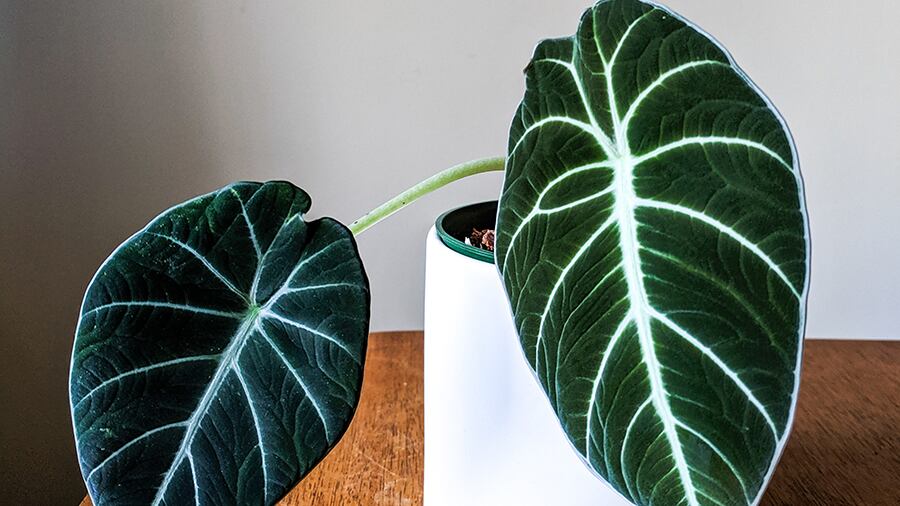Naomi Painter wasn't in a great place when she decided to buy her first houseplant.
She had just left her job at a local nonprofit and found herself unemployed for the first time in her life. On a whim, she walked into a Portland flower shop and bought a Pleiospilos nelii, or "split rock" plant, whose leaves grow from the center so that old fronds fall away and new ones sprout up in their place. For Painter, the purchase was symbolic—the mark of a new beginning, and a practical way to keep busy.
In a matter of months, one plant turned into two, which turned into 10, which turned into a collection rivaling any amateur greenhouse.
At her family's gentle nudging, Painter decided to start an Instagram account (@naomiplanter) just for her plants—her personal account had become overrun with flora, and she wanted a way to connect directly with people doling out plant advice on the internet.
"I posted about one of my plants every single day," says Painter, 37. "Then I got a whole lot of followers."
By early 2019, after posting every day for a year, Painter had amassed 20,000 followers. She had, inadvertently, stumbled upon a new side gig: that of plant influencer.
The country is in the midst of a nationwide houseplant boom—sales have doubled in the past three years, growing to $1.7 billion annually. It's a trend largely driven by consumers in Painter's demographic: According to the 2018 National Gardening Survey, millennials occupy one-third of all gardening households, which represents an all-time high. And that enthusiasm for all things green and leafy has, naturally, spun off onto social media. The most popular plant accounts on Instagram have tens of thousands of followers, guiding botanical trends and turning first-time plant owners into fellow enthusiasts.
Painter mostly runs her account to keep in contact with the virtual plant community, which she describes as a "huge family," particularly in Portland. The analytics suggest her audience is mostly women between the ages of 25 and 35 who frequently swap direct messages, wearing their U.S. Department of Agriculture Plant Hardiness Zone numbers like name tags. (Portland is USDA zone 8b.)
So-called plantfluencers tend to split into two camps: those who stay out of the shot and photograph their plants catalog-style, and those for whom plants are selfie accessories. Painter falls into the first camp, posting high-exposure portraits of new finds with lengthy captions on the successes and challenges of their care.

But for Tylor Rogers, a 24-year-old Indiana native, Instagram was an entry point into Portland's already crowded plant-shop space.
His love affair with ornamental horticulture began as a Midwestern college student, which happened to coincide with social media's obsession with plant collecting. Rogers' personal Instagram account (@urlocalplantboy), self-described as a "photojournal of plants," took on a life of its own, attracting 57,000 followers over the course of four years. Today, the account functions mostly to promote Rogers' fledgling plant shop, Arium Botanicals, which opened in the Eliot neighborhood last fall.
"At first, a lot of people were coming in saying they found us through my personal account," Rogers says. "Instagram, at least in the beginning, had a big impact on people discovering our space."
Older Portland plant shops are benefiting as well. Pistils Nursery, which has two locations in Portland, has been in business for nearly two decades. Its follower count has leapt to 176,000 in recent years—an unusually high number for a neighborhood shop.
Solabee Flowers & Botanicals, which also has two Portland locations, has a similar story. Co-founded by Alea Joy and Sarah Helmstetter in 2009, the store started mainly as a full-service floral studio and has since shifted its focus to plant sales to meet public demand. The business's Instagram account tops 52,000 followers.
According to general manager Olivia Cooner, online buzz around plants has spiked in the past year and a half, and business has spiked with it. Rare collector plants like the variegated "String of Hearts" and philodendron "Painted Lady," which used to sit around for days or weeks at a time, now sell within minutes of being posted on Instagram.
"It's crazy," Cooner says. "I definitely think it's beyond an Instagram fad. Young people really care about how to actually take care of these plants and make them last for a long time."
For many 20-somethings, the draw of plant ownership goes beyond soft-lensed aestheticism on social media. Actual parenthood does not square with current economic and environmental uncertainties. "Plant parenthood," however, is much more tenable. Growing a plant to full health might not look like traditional family planning, but it scratches a parental itch nonetheless.
"There's a lot of existential dread that's part of this," Painter says. "It's nice to have plants around to look at and think about and take care of."
Painter's two-bedroom apartment is at capacity with 165 plants—new additions mean she sometimes has to give plants away. She doesn't post as often as she used to: She got a new job working part time for Multnomah County and decided to begin a private counseling practice, which takes up much of her time. But she still commits herself to posting four to six times a week.
For Painter, plant parenthood is one bit of lush, vibrant life wedged between all the other routines that meet her when she gets home.
"I greet my dog," she says, "and I'm checking my plants."
The Hottest Houseplant of the Moment: Variegated Monstera

Almost every plant store in Portland confirms there is one singular rock star in the world of Instagram botany: the variegated monstera, a visually striking climbing plant that costs hundreds of dollars, depending on the size. No two are the same—the variegation comes from a mutation in the chlorophyll, leading to tie-dye patterns of cream and white on dark green leaves.
According to Gurton's Plant Shop in Hillsdale, it is the "rare Pokémon of houseplants." Variegated monsteras are essentially test-tube plants, grown in Thai labs through tissue culture cloning, which means they're difficult to find. If you can swallow the price, make sure to give your monstera plenty of shaded, indirect sunlight and a roomy corner where it can grow freely—some varieties sprout up to 10 feet.

Five Portland-Made Blankets, Reviewed
How to Work From Home Without Losing Your Mind
The Great Oregon Movie Binge Watch
Four Portland Delivery Services You Might Not Know About
Millennials on Social Media Are Driving a Nationwide Houseplant Boom

